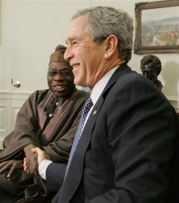


Posted by By GEORGE GEDDA, Associated Press Writer on



President Bush said Wednesday that he appreciates the government of Nigeria's work to apprehend Charles Taylor, a warlord and rebel leader charged with crimes related to Sierra Leone's 14-year civil war.
President Bush said Wednesday that he appreciates the government of Nigeria's work to apprehend Charles Taylor, a warlord and rebel leader charged with crimes related to Sierra Leone's 14-year civil war.
"The fact that Charles Taylor will be brought to justice in a court of law will help Liberia and is a signal, Mr. President, of your deep desire for there to be peace in your neighborhood," Bush told Nigerian President Olesegun Obasanjo in an Oval Office meeting.
Obasanjo said he rejected claims that Nigerian authorities may have been complicit in the escape Tuesday of Taylor, the former Liberian president who was living in exile in Nigeria.
"I do not agree, must disagree that we have been negligent in the way we handled the Charles Taylor issue," Obasanjo said.
In 2003, Obasanjo cut a deal that allowed Taylor to settle in Nigeria. Recently, he agreed to a request by Liberia's new president, Ellen Johnson Sirleaf, to surrender Taylor for trial at the international criminal tribunal in Sierra Leone.
Asked at a later event in Washington whether he was confident that Taylor would stand trial, Bush said: "I am much more confident today than I was yesterday. ... I think he is headed where he belongs, which is trial."
Taylor is charged with backing Sierra Leone rebels, including child fighters, who terrorized victims by chopping off their arms, legs, ears and lips. He would be the first African leader to face trial for crimes against humanity.
"If we had been negligent, then Charles Taylor would have got away," Obasanjo said in his defense. "He would not have been arrested if there was negligence."
Bush said the two leaders also talked about Darfur and the Sudan, and an international response in helping end a 21-year civil war. The U.N. Security Council voted last week to keep U.N. peacekeepers in Sudan to monitor an accord ending the civil war and authorized planning for the expected extension of the U.N. force's operations to Darfur.
"I made it very clear to him (Obasanjo) that we are deeply concerned about the humiliation, the rape, the murder that is taking place among the - against the citizens of Darfur. He agreed," Bush said.
Bush said he has made it clear to the Sudanese government that there will be an international response in working toward peace.
"We talked about a dual track, that the rebels must come together and negotiate with the government, and at the same time we talked about bolstering the AU (African Union) peacekeeping force with a blue helmet force, and I explained my desire to have a NATO overlay, to make sure that force is robust," Bush said.
Bush said he also asked Obasanjo about conditions in Nigeria's oil-rich southern delta. Obasanjo has been criticized for failing to control militants who have launched increasing attacks on oil facilities in the area. Nigeria is the fifth-biggest source of U.S. oil imports.
"We are very grateful that the measures we are taking, which are essentially socio-economic measures, to address some of the grievances, identified grievances (that) will resolve the issue of the Niger Delta," Obasanjo said.
The Nigerian leader said he also talked to Bush about West Africa's Gulf of Guinea, where an oil boom could outpace Persian Gulf exports to America in a decade. The United States is wary about the security of an increasingly strategic part of the world that some U.S. officials believe is vulnerable to piracy, political instability and terrorism.
Obasanjo said he talked to Bush about how he is working to establish a Gulf of Guinea commission to address any misunderstandings between Nigeria and other countries in the Gulf and how activity in the region can be monitored.
The top news at the meeting, however, was Taylor's arrest while he was trying to cross Nigeria's southern border with Cameroon. Talking to reporters before the meeting, Obasanjo gave few details about the apprehension except to say that Taylor was picked up in a car with his wife and taken to a regional state capital.
Taylor's escape had threatened to cast a pall over Wednesday's meeting with Bush because the U.S. administration had given a high priority to Taylor's prosecution at the tribunal.
U.S. officials met with the presidential delegation after its arrival in Washington Tuesday night. Obasanjo said there was no hint during the discussions that the White House might cancel the meeting with Bush because of Taylor's escape.
___
On the Net:
CIA World Factbook on Liberia:
http://www.cia.gov/cia/publications/factbook/geos/li.html

